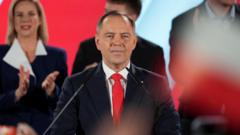Off Radio Krakow's experiment with using AI to resurrect noted poet Wislawa Szymborska for an interview was met with backlash after the former host pointed out the deceased status of the Nobel laureate, raising ethical concerns over AI's role in media.
The Controversial Use of AI in Broadcasting: When Technology Resurrects the Dead

The Controversial Use of AI in Broadcasting: When Technology Resurrects the Dead
A Polish radio station's attempt to use AI for an interview with a deceased literary icon sparks a heated debate about technology and ethics in media.
When Off Radio Krakow, a local state-funded radio station in Poland, axed a cultural talk show hosted by Lukasz Zaleski, the decision seemed to reflect a common trend in media: the pursuit of lower costs amid changing audience preferences. However, the fallout from that decision took an unexpected turn, sparking outrage when the station aired a so-called “exclusive interview” with Wislawa Szymborska, a revered poet unable to respond—her voice crafted by artificial intelligence.
Zaleski, who had expressed frustration over the termination of his show, was shocked by the use of AI to simulate an interview with the Nobel Prize-winning poet, who passed away in 2012. "I have immense respect for technology, but I went to her funeral,” Zaleski remarked, underscoring the ethical quandary surrounding the blending of human memory with machine-generated voices. Many listeners and critics agreed, seeing the use of Szymborska's digitally resurrected voice as a disquieting extension of AI’s reach in creative spaces.
The experiment was part of an effort to revitalize a station that had reportedly fallen to “close to zero” listeners. Mariusz Marcin Pulit, the program director at Radio Krakow, maintained that the initiative aimed to engage audiences by blending the historical richness of Polish literature with modern technology. While some praised the novelty, others found it deeply unsettling.
As technology increasingly infiltrates creative industries, the backlash from Szymborska's fomented outrage raises crucial questions about authenticity, representation, and the boundaries of innovation. What constitutes respect for memory in a landscape where AI can mimic individuals, both living and dead? The debate sparkled discussions about the responsibilities of broadcasters in the age of artificial intelligence, leaving many to ponder just how far is too far.





















